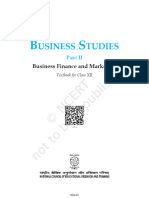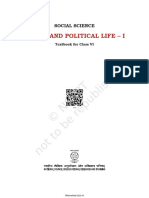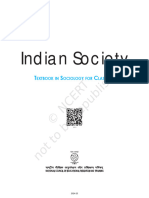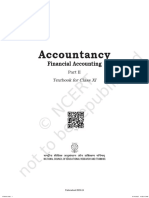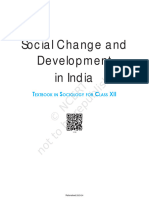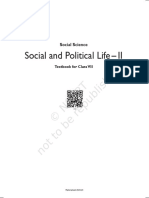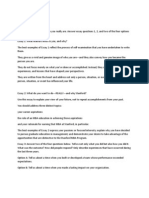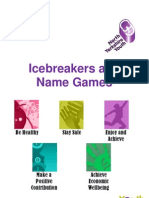Usiness Tudies: Business Finance and Marketing
Usiness Tudies: Business Finance and Marketing
Uploaded by
AyushCopyright:
Available Formats
Usiness Tudies: Business Finance and Marketing
Usiness Tudies: Business Finance and Marketing
Uploaded by
AyushOriginal Title
Copyright
Available Formats
Share this document
Did you find this document useful?
Is this content inappropriate?
Copyright:
Available Formats
Usiness Tudies: Business Finance and Marketing
Usiness Tudies: Business Finance and Marketing
Uploaded by
AyushCopyright:
Available Formats
Business Studies
Part II
Business Finance and Marketing
Textbook for Class XII
Rationalised 2023-24
0__Prelims.indd 1 01-09-2022 12:28:31
12114 – Business Studies Part II ISBN 81-7450-697-7 (Part I)
Textbook for Class XII 81-7450-756-6 (Part II)
ALL RIGHTS RESERVED
First Edition No part of this publication may be reproduced, stored in a retrieval
May 2007 Jyaistha 1929 system or transmitted, in any form or by any means, electronic,
mechanical, photocopying, recording or otherwise without the prior
Reprinted permission of the publisher.
February 2008, March 2009, This book is sold subject to the condition that it shall not, by way of
trade, be lent, re-sold, hired out or otherwise disposed of without
January 2010, January 2011, the publisher’s consent, in any form of binding or cover other than
January 2012, January 2013, that in which it is published.
November 2013, January 2015, The correct price of this publication is the price printed on this page.
May 2016, January 2018, Any revised price indicated by a rubber stamp or by a sticker or
by any other means is incorrect and should be unacceptable.
February 2019, November 2019 and
January 2021 OFFICES OF THE PUBLICATION
DIVISION NCERT
Revised Edition
August 2022 Sharavana 1944 NCERT Campus
Sri Aurobindo Marg
New Delhi 110 016 Phone : 011-26562708
108, 100 Feet Road
Hosdakere Halli Extension
Banashankari III Stage
Bengaluru 560 085 Phone : 080-26725740
PD 83T HK
Navjivan Trust Building
P.O. Navjivan
Ahmedabad 380 014 Phone : 079-27541446
© National Council of Educational
Research and Training, 2007, CWC Campus
Opp. Dhankal Bus Stop
2022 Panihati
Kolkata 700 114 Phone : 033-25530454
CWC Complex
Maligaon
Guwahati 781 021 Phone : 0361-2674869
0361-2674869
Publication Team
Head, Publication : Anup Kumar Rajput
Division
` ....00 Chief Production : Arun Chitkara
Officer
Chief Business : Vipin Dewan
Manager
Chief Editor (In charge) : Bijnan Sutar
Printed on 80 GSM paper with NCERT Assistant Editor : Vineet Joshi
watermark Production Assistant : ...
Published at the Publication Division
by the Secretary, National Council of Cover
Educational Research and Training, Shweta Rao
Sri Aurobindo Marg, New Delhi 110 016 Illustrations
and printed at Suresh Lal
Rationalised 2023-24
0__Prelims.indd 2 01-09-2022 12:28:31
Foreword
The National Curriculum Framework (NCF), 2005, recommends that
children’s life at school must be linked to their life outside the school.
This principle marks a departure from the legacy of bookish learning
which continues to shape our system and causes a gap between the
school, home and community. The syllabi and textbooks developed on
the basis of NCF signify an attempt to implement this basic idea. They
also attempt to discourage rote learning and the maintenance of sharp
boundaries between different subject areas. We hope these measures will
take us significantly further in the direction of a child-centred system
of education outlined in the National Policy on Education (1986).
The success of this effort depends on the steps that school
principals and teachers will take to encourage children to reflect on
their own learning and to pursue imaginative activities and questions.
We must recognise that, given space, time and freedom, children
generate new knowledge by engaging with the information passed on
to them by adults. Treating the prescribed textbook as the sole basis
of examination is one of the key reasons why other resources and sites
of learning are ignored. Inculcating creativity and initiative is possible
if we perceive and treat children as participants in learning, not as
receivers of a fixed body of knowledge.
These aims imply considerable change in school routines and
mode of functioning. Flexibility in the daily time-table is as necessary
as rigour in implementing the annual calendar so that the required
number of teaching days are actually devoted to teaching. The methods
used for teaching and evaluation will also determine how effective this
textbook proves for making children’s life at school a happy experience,
rather than a source of stress or boredom. Syllabus designers have
tried to address the problem of curricular burden by restructuring and
reorienting knowledge at different stages with greater consideration
for child psychology and the time available for teaching. The textbook
attempts to enhance this endeavour by giving higher priority and space
to opportunities for contemplation and wondering, discussion in small
groups, and activities requiring hands-on experience.
Rationalised 2023-24
0__Prelims.indd 3 01-09-2022 12:28:31
iv
The National Council of Educational Research and Training (NCERT)
appreciates the hardwork done by the textbook development committee
responsible for this book. We wish to thank the Chairperson of the
advisory group in Social Sciences Professor Hari Vasudevan and the
Chief Advisor for this book, D.P.S. Verma, Professor (Retd.), Delhi School
of Economics, University of Delhi, and Dr. G.L. Tayal, Reader, Ramjas
College, University of Delhi, for guiding the work of this committee.
Several teachers contributed to the development of this textbook; we are
grateful to their principals for making this possible. We are indebted to
the institutions and organisations which have generously permitted us
to draw upon their resources, material and personnel. We are especially
grateful to the members of the National Monitoring Committee, appointed
by the Department of Secondary and Higher Education, Ministry of
Human Resource Development, under the chairpersonship of Professor
Mrinal Miri and Professor. G.P. Deshpande, for their valuable time and
contribution. As an organisation committed to systemic reform and
continuous improvement in the quality of its products, NCERT welcomes
comments and suggestions which will enable us to undertake further
revision and refinement.
Director
New Delhi National Council of Educational
20 November 2006 Research and Training
Rationalised 2023-24
0__Prelims.indd 4 01-09-2022 12:28:31
Rationalisation of Content in the Textbooks
In view of the COVID-19 pandemic, it is imperative to reduce content
load on students. The National Education Policy 2020, also emphasises
reducing the content load and providing opportunities for experiential
learning with creative mindset. In this background, the NCERT has
undertaken the exercise to rationalise the textbooks across all classes.
Learning Outcomes already developed by the NCERT across classes
have been taken into consideration in this exercise.
Contents of the textbooks have been rationalised in view of the
following:
• Overlapping with similar content included in other subject areas in
the same class
• Similar content included in the lower or higher class in the same
subject
• Difficulty level
• Content, which is easily accessible to students without much
interventions from teachers and can be learned by children through
self-learning or peer-learning
• Content, which is irrelevant in the present context
This present edition, is a reformatted version after carrying out
the changes given above.
Rationalised 2023-24
0__Prelims.indd 5 01-09-2022 12:28:32
Rationalised 2023-24
0__Prelims.indd 6 01-09-2022 12:28:32
Textbook Development Committee
Chairperson, Advisory Committee for Textbooks in Social Sciences at
Senior Secondary Level
Hari Vasudevan, Professor, Department of History, University of
Calcutta, Kolkata
Chief Advisor
D.P.S. Verma, Retired Professor, Department of Commerce, Delhi School
of Economics, University of Delhi, Delhi.
Advisor
G.L. Tayal, Reader, Ramjas College, University of Delhi, Delhi.
Members
Anand Saxena, Reader, Deen Dayal Upadhyaya College, University of
Delhi, Delhi.
Davinder K. Vaid, Professor, Department of Education in Social Sciences
and Humanities, NCERT, New Delhi.
M.M. Goyal, Reader, PGDAV College, University of Delhi, Delhi.
Narsimha Murthy, Principal, University Post-Graduate College, Subedari,
Anam Konda, Distt. Warangal, Andhra Pradesh.
Pooja Dasani, PGT (Commerce) Convent of Jesus and Mary,
Gol Dakkhana, New Delhi.
R.B. Solanki, Principal, B.R. Ambedkar College, University of Delhi, Delhi.
Ruchi Kakkar, Lecturer, Acharya Narendra Dev College, University of
Delhi, Delhi.
Shruti Bodh Aggarwal, Vice-Principal, Rajkiya Pratibha Vikas Vidyalaya,
Kishanganj, Delhi.
Sumati Verma, Reader, Sri Aurobindo College, University of Delhi, Delhi.
Y.V. Reddy, Reader, Department of Commerce, Goa University, Goa.
Member Coordinator
Minoo Nandrajog, Reader, Department of Education in Social Sciences
and Humanities, NCERT, New Delhi.
Rationalised 2023-24
0__Prelims.indd 7 01-09-2022 12:28:32
Acknowledgements
The National Council of Educational Research and T raining
acknowledges the valuable contributions of the Textbook Development
Commiteee, which took considerable pain in the development and review
of manuscript as well.
Thanks are due to Savita Sinha Professor and Head, Department
of Education in Social Science for her guidance and constant support
at every stage of the textbook development process. The textbook has
been reworked and updated at appropriate point of time in the context of
recent development in business scenario and the Compaines Act 2013.
The contribution of practcing teacher of Business Studies is also duly
acknowledged for develping e-resourses for QR Codes.
The contribution of APC Office, Administration, Publication Division,
and Secretariat of NCERT are also duly acknowledged for bringing out
the updated textbook of Business Studies.
Note to the Teacher
This textbook is expected to provide a good understanding of the
environment in which a business operates. A manager has to analyse the
complex, dynamic situations in which a business is placed. Therefore,
content enrichment in the form of business news and abstracts of articles
from business journals and magazines has been given as inset material
(boxes). This will encourage students to be observant about all business
activity and discover what is happening in business organisations with
the expectation that they will update their knowledge through the use
of libraries, newspapers, business oriented TV programmes and the
Internet. Various types of questions are given and case problems have
been introduced to test the application of subject knowledge to realistic
business situations.
Rationalised 2023-24
0__Prelims.indd 8 01-09-2022 12:28:32
Contents
Foreword iii
Chapter 9 Financial Management 215
Chapter 10 Marketing 242
Chapter 11 Consumer Protection 289
Rationalised 2023-24
0__Prelims.indd 9 01-09-2022 12:28:32
Contents (Part I)
Chapter 1 Nature and Significance of Management 1
Chapter 2 Principles of Management 30
Chapter 3 Business Environment 69
Chapter 4 Planning 91
Chapter 5 Organising 109
Chapter 6 Staffing 139
Chapter 7 Directing 169
Chapter 8 Controlling 201
Rationalised 2023-24
0__Prelims.indd 10 01-09-2022 12:28:32
You might also like
- Project Closeout Transition ChecklistDocument3 pagesProject Closeout Transition ChecklistBhupinder SinghNo ratings yet
- Business Studies Part IIDocument104 pagesBusiness Studies Part IIHome Grown CreationNo ratings yet
- NCERT Class 12 Business Studies Book (Part II)Document100 pagesNCERT Class 12 Business Studies Book (Part II)ajaytp496No ratings yet
- Lesy 1 PsDocument14 pagesLesy 1 PsBrijnandan KumarNo ratings yet
- Usiness Tudies: Business Finance and MarketingDocument10 pagesUsiness Tudies: Business Finance and Marketingsumeetangural123No ratings yet
- English NcertDocument152 pagesEnglish NcertYasir SaeedNo ratings yet
- Gehc 1 PsDocument12 pagesGehc 1 PsRaghavendra Rao TholetiNo ratings yet
- History 7 THDocument120 pagesHistory 7 THTushar KumarNo ratings yet
- Chemistry: Textbook For Class XIDocument10 pagesChemistry: Textbook For Class XIPain MiseryNo ratings yet
- Chemistry Part-2 (Class 11)Document108 pagesChemistry Part-2 (Class 11)Sriram PrustyNo ratings yet
- Olitics in Ndia Since Ndependence: T P S C XiiDocument13 pagesOlitics in Ndia Since Ndependence: T P S C XiiKeshav AgarwalNo ratings yet
- Ps Prelims BookDocument12 pagesPs Prelims Bookdavelkiller69No ratings yet
- Polity 6thDocument96 pagesPolity 6thMandeep BeniwalNo ratings yet
- Business Studies: Textbook For Class XIDocument10 pagesBusiness Studies: Textbook For Class XIMonu KumarNo ratings yet
- Politics 6thDocument96 pagesPolitics 6thRadhika GoelNo ratings yet
- Keac 1 PsDocument12 pagesKeac 1 PsS'il Vous PlaîtNo ratings yet
- Lesy 1 PsDocument14 pagesLesy 1 PsABHIMAT PANDEYNo ratings yet
- Sociology 12Document151 pagesSociology 12majhimoni.2020No ratings yet
- Fess 3 PsDocument16 pagesFess 3 PsW1z ArdNo ratings yet
- Keph2ps Merged PDFDocument164 pagesKeph2ps Merged PDFNimal 007No ratings yet
- SCIENCE NCERT (Dragged)Document1 pageSCIENCE NCERT (Dragged)rydywyhsmdNo ratings yet
- Gehc 1 PsDocument12 pagesGehc 1 Pselysion.011No ratings yet
- Keac 2 PsDocument12 pagesKeac 2 PsarunrajNo ratings yet
- Kehe 2 PsDocument14 pagesKehe 2 Pstimeecoffee46No ratings yet
- Jess 4 PsDocument14 pagesJess 4 PsopNo ratings yet
- Keac 1 PsDocument12 pagesKeac 1 Psvishnujoshi4269No ratings yet
- Leps 2 PsDocument13 pagesLeps 2 Psmpshekhawat451No ratings yet
- NCERT Class 8 GeographyDocument64 pagesNCERT Class 8 GeographyvikbhartiNo ratings yet
- Lehe 1 PsDocument24 pagesLehe 1 PsAmit Prakash SahooNo ratings yet
- Science (Class 6)Document136 pagesScience (Class 6)Sriram PrustyNo ratings yet
- Fesc 1 PsDocument12 pagesFesc 1 Psvempati srilathaNo ratings yet
- NCERT-Accountancy Book 1Document288 pagesNCERT-Accountancy Book 1KalyanNo ratings yet
- 11th Chemistry Part-IIDocument108 pages11th Chemistry Part-IIsirivanth17No ratings yet
- Kech 2 PsDocument10 pagesKech 2 Psankitpp9899No ratings yet
- PrelimsDocument10 pagesPrelimsNikid AlisonNo ratings yet
- Lesy 2 PsDocument14 pagesLesy 2 PsLogic BaluNo ratings yet
- NCERT Class 11 Accountancy Book (Part I)Document288 pagesNCERT Class 11 Accountancy Book (Part I)Aashu DhalwalNo ratings yet
- Class 7 - SociologyDocument126 pagesClass 7 - SociologyHarshit DayalNo ratings yet
- Gess 1 PsDocument14 pagesGess 1 PsPrerna RajputNo ratings yet
- Economics English 12th Macro 2Document116 pagesEconomics English 12th Macro 2khannaneeraj209No ratings yet
- Lehe 1 PsDocument24 pagesLehe 1 Pspspasp213No ratings yet
- Lehe1ps (1) MergedDocument231 pagesLehe1ps (1) MergedJeevansh WadhwaNo ratings yet
- Lefa 1 PsDocument12 pagesLefa 1 Psdikshakri1125No ratings yet
- Jhde1ps MergedDocument276 pagesJhde1ps MergedPurbankan DasNo ratings yet
- Jess 4 PsDocument14 pagesJess 4 PsYESHWANTH KANIKENo ratings yet
- Accountancy Financial Accounting Part-IDocument296 pagesAccountancy Financial Accounting Part-ITanishk GuptaNo ratings yet
- Indian History (III) - 12Document132 pagesIndian History (III) - 12l3gitghostNo ratings yet
- Chapter 1 BisnessDocument10 pagesChapter 1 BisnessAviral MishraNo ratings yet
- Gess 2 PsDocument12 pagesGess 2 PsJidu M DivakaranNo ratings yet
- Lebo 1 PsDocument12 pagesLebo 1 Pstanays.rprNo ratings yet
- 2023-24 NCERT 10 SST (Pol Sci) Complete BookDocument88 pages2023-24 NCERT 10 SST (Pol Sci) Complete Bookamandeep63kaurNo ratings yet
- Legy 2 PsDocument10 pagesLegy 2 Psshrutisinha5439No ratings yet
- Fine Arts - II NcertDocument156 pagesFine Arts - II NcertKapilNo ratings yet
- Enhancing Skills in Sri Lanka for Inclusion, Recovery, and ResilienceFrom EverandEnhancing Skills in Sri Lanka for Inclusion, Recovery, and ResilienceNo ratings yet
- Onsumer Rotection: Learning ObjectivesDocument16 pagesOnsumer Rotection: Learning ObjectivesAyushNo ratings yet
- Inancial Anagement: Learning ObjectivesDocument27 pagesInancial Anagement: Learning ObjectivesAyushNo ratings yet
- 2023 Practice Paper 1Document16 pages2023 Practice Paper 1AyushNo ratings yet
- Trade and Cash Discount NotesDocument3 pagesTrade and Cash Discount NotesAyushNo ratings yet
- Medicinal Plants (Synopsis)Document2 pagesMedicinal Plants (Synopsis)AyushNo ratings yet
- Chapter Eight: Venn Diagrams As Instructional TacticsDocument18 pagesChapter Eight: Venn Diagrams As Instructional TacticsNatasha RambaranNo ratings yet
- Heather Burrell CV-2014Document3 pagesHeather Burrell CV-2014lifelongmai comNo ratings yet
- Planning For Prevention Is Paramount: A Plan For The Prevention of Unproductive Behaviour'Document11 pagesPlanning For Prevention Is Paramount: A Plan For The Prevention of Unproductive Behaviour'api-376096379No ratings yet
- MD Walee Zaman, PMP®: Introduction To Project Management-PMI (PMP) Frame - WorkDocument1 pageMD Walee Zaman, PMP®: Introduction To Project Management-PMI (PMP) Frame - WorkRubayetNo ratings yet
- Script For A MeetingDocument3 pagesScript For A Meetingrachel batallerNo ratings yet
- Syllabus ToxicologyDocument2 pagesSyllabus ToxicologyKoert Oosterhuis100% (1)
- Classroom Interaction Team eDocument17 pagesClassroom Interaction Team eerwinNo ratings yet
- 10th General Science Notes Unit 5Document23 pages10th General Science Notes Unit 5hiba nazirNo ratings yet
- DIP Sri LankaDocument3 pagesDIP Sri LankaRuwan Dissanayake100% (1)
- Jurnal Modul 1 NuritaDocument12 pagesJurnal Modul 1 Nuritailyas126No ratings yet
- Essay Questions For AdmissionDocument3 pagesEssay Questions For Admissionanand801No ratings yet
- Neev - Academy - Yemalur - Fee Schedule 2019-20Document2 pagesNeev - Academy - Yemalur - Fee Schedule 2019-20Vidhi GuptaNo ratings yet
- Icebreakers and Name GamesDocument15 pagesIcebreakers and Name Gamesjames_nyyNo ratings yet
- Grade4 - English - Q2 - W5 - GLAK V.3Document16 pagesGrade4 - English - Q2 - W5 - GLAK V.3Be MotivatedNo ratings yet
- Ibrahim Kalin - Knowledge in Later Islamic Philosophy - Mulla Sadra On Existence, Intellect, and Intuition (2010) PDFDocument338 pagesIbrahim Kalin - Knowledge in Later Islamic Philosophy - Mulla Sadra On Existence, Intellect, and Intuition (2010) PDFBarış Devrim Uzun100% (1)
- Math-9 Q2 Mod5Document19 pagesMath-9 Q2 Mod5Adrian James S Angeles67% (3)
- Pie Chart PDFDocument8 pagesPie Chart PDFครูไก่น้อย หนูพัดNo ratings yet
- Action Plan For NAT G12 NAT G6 and ELLNADocument5 pagesAction Plan For NAT G12 NAT G6 and ELLNAmarie cristine caserNo ratings yet
- India Lesson Plan DraftDocument4 pagesIndia Lesson Plan DraftJohn Benedict VocalesNo ratings yet
- Module in Mathematics 9: Pasay - M9 - Q1-W1-02Document5 pagesModule in Mathematics 9: Pasay - M9 - Q1-W1-02Shein SheilaNo ratings yet
- School-Memo-NDPR 2023Document4 pagesSchool-Memo-NDPR 2023Raniel R BillonesNo ratings yet
- FY2010 Schedule C Merge FinalDocument407 pagesFY2010 Schedule C Merge FinalAzi PaybarahNo ratings yet
- MANCOM SpeechDocument1 pageMANCOM SpeechRalna Dyan Taruc FloranoNo ratings yet
- Workshop On Data Analysis Using IBM SPSS in Social Science ResearchDocument3 pagesWorkshop On Data Analysis Using IBM SPSS in Social Science ResearchYepuru ChaithanyaNo ratings yet
- Iloilo City Regulation Ordinance 2018-067Document6 pagesIloilo City Regulation Ordinance 2018-067Iloilo City CouncilNo ratings yet
- Assertion Training: TI 005 - ThematicDocument31 pagesAssertion Training: TI 005 - ThematicRudianto AhmadNo ratings yet
- DLP Grade-7 Final DeguzmanDocument15 pagesDLP Grade-7 Final DeguzmanDe Guzman Diane Marie B.No ratings yet
- What Is Classroom Observation Guide For ReportingDocument4 pagesWhat Is Classroom Observation Guide For ReportingMark Bryan CervantesNo ratings yet
- African Curriculum, Government and Economic StatusDocument10 pagesAfrican Curriculum, Government and Economic StatusApple Santos MabagosNo ratings yet




